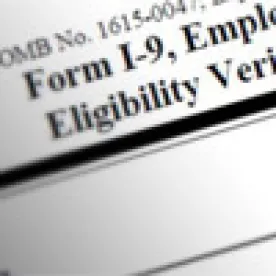On March 20, 2020, the Department of Homeland Security (DHS) announced it would exercise discretion to defer the physical presence requirements associated with Employment Eligibility Verification (Form I-9) in relation to hiring and re-verifying employees. Prior to this announcement, DHS policy required employer representatives to conduct the I-9 verification process in person, examining an employee’s original documents in the presence of the employee.
In light of the COVID-19 outbreak turning an unprecedented number of US workers into remote employees, DHS will temporarily permit employers with employees taking physical proximity precautions to inspect the Form I-9, Section 2 identity and employment eligibility documents remotely using modalities such as video link (e.g., Skype, FaceTime or similar), fax or email.
Here are a few steps and caveats employers need to know in order to stay compliant per the DHS announcement:
-
The employee must still timely complete Section 1 of the I-9 on or before the first day of employment.
-
Employers must inspect the Section 2 documents remotely and complete Section 2 within three business days of hire.
-
Employers also should enter “COVID-19” as the reason for the physical inspection delay in the Section 2 “Additional Information” field.
-
Employers who avail themselves of this option should be prepared to provide written documentation of their remote onboarding and teleworking policy for each employee in conjunction with a DHS I-9 compliance inspection.
-
Once normal operations resume, all employees who completed the Form I-9 using remote verification, must report to their employer within three business days for in-person verification of identity and employment eligibility documentation.
-
Once the documents have been physically inspected, the employer should add, “documents physically examined” with the date of inspection to the Section 2 “Additional Information” field, or to Section 3 (if the remote examination was for reverification purposes).
These relaxed verification provisions are effective for 60 days from March 20, 2020 OR within 3 business days after the termination of the National Emergency, whichever comes first.
In the announcement, DHS stressed these provisions only apply to “employers and workplaces that are operating remotely. If there are employees physically present at a work location, no exceptions are being implemented at this time for in-person verification of identity and employment eligibility documentation for Form I-9, Employment Eligibility Verification.” However, DHS will evaluate, on a case-by-case basis, the application of this virtual verification process for newly hired employees or existing employees subject to COVID-19 quarantine or lockdown protocols.
Furthermore, DHS announced, effective March 19, 2020, any employers served with Notices of Inspection (NOI) relating to I-9 compliance and employer sanctions enforcement during the month of March 2020 that have not already responded will be granted an automatic extension for 60 days from the NOI effective date. At the end of the 60-day extension period, DHS will determine if it will grant additional extensions.
In a related development, DHS announced temporary policy changes to minimize burdens on employers and employees in relation to E-Verify compliance during the COVID-19 National Emergency:
-
E-Verify is extending the timeframe to take action to resolve Social Security Administration (SSA) Tentative Nonconfirmations (TNCs) due to SSA office closures to the public. DHS has yet to provide the specific duration of the extended timeframe.
-
E-Verify is also extending the timeframe to take action to resolve Department of Homeland Security (DHS) TNCs in limited circumstances when an employee cannot resolve a TNC due to public or private office closures.
-
Employers are still required to create cases for their new hires within three business days from the date of hire.
-
Employers must use the hire date from the employee’s Form I-9 when creating the E-Verify case. If case creation is delayed due to COVID-19 precautions, select “Other” from the drop-down list and enter “COVID-19” as the specific reason.
-
Employers may not take any adverse action against an employee because the E-Verify case is in an interim case status, including while the employee’s case is in an extended interim case status.




 />i
/>i

